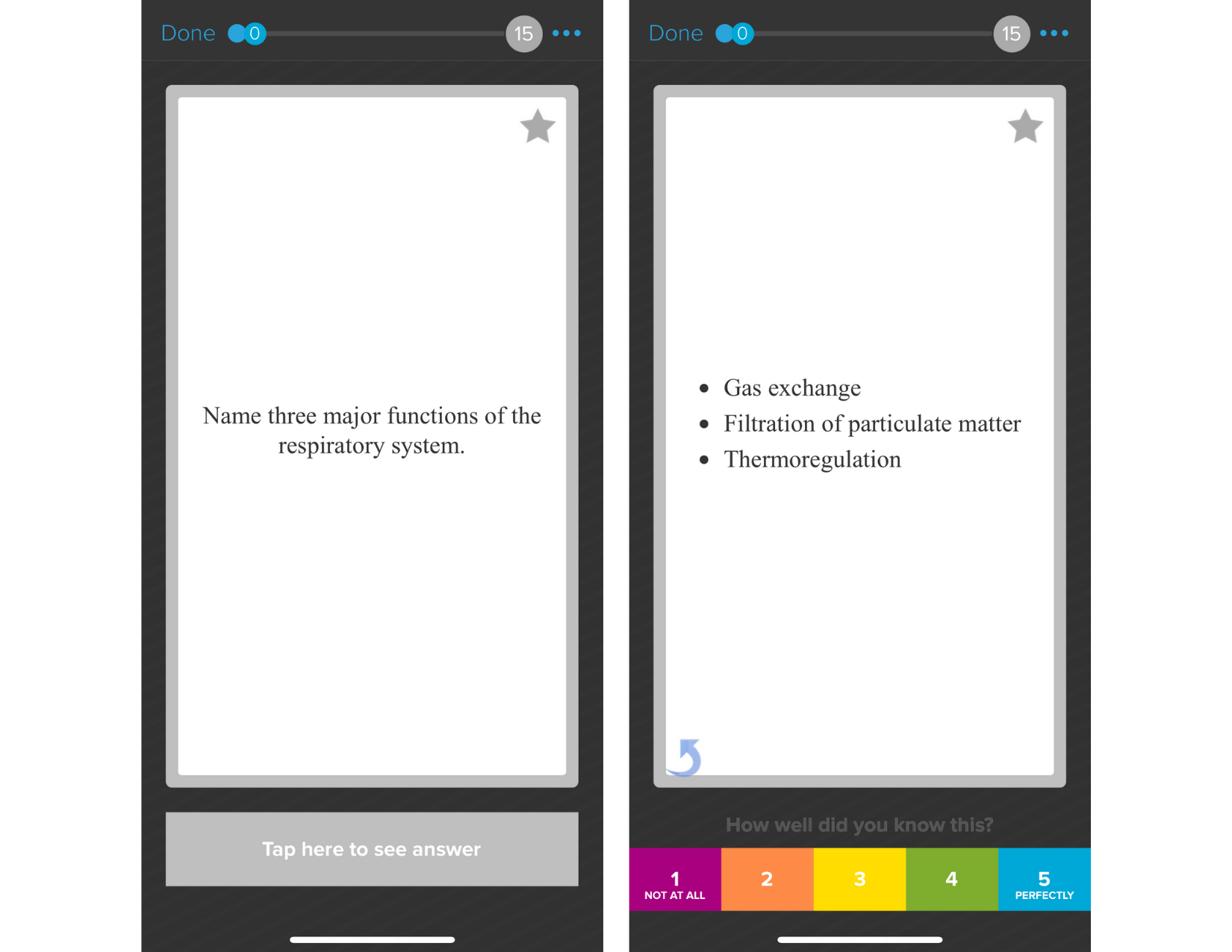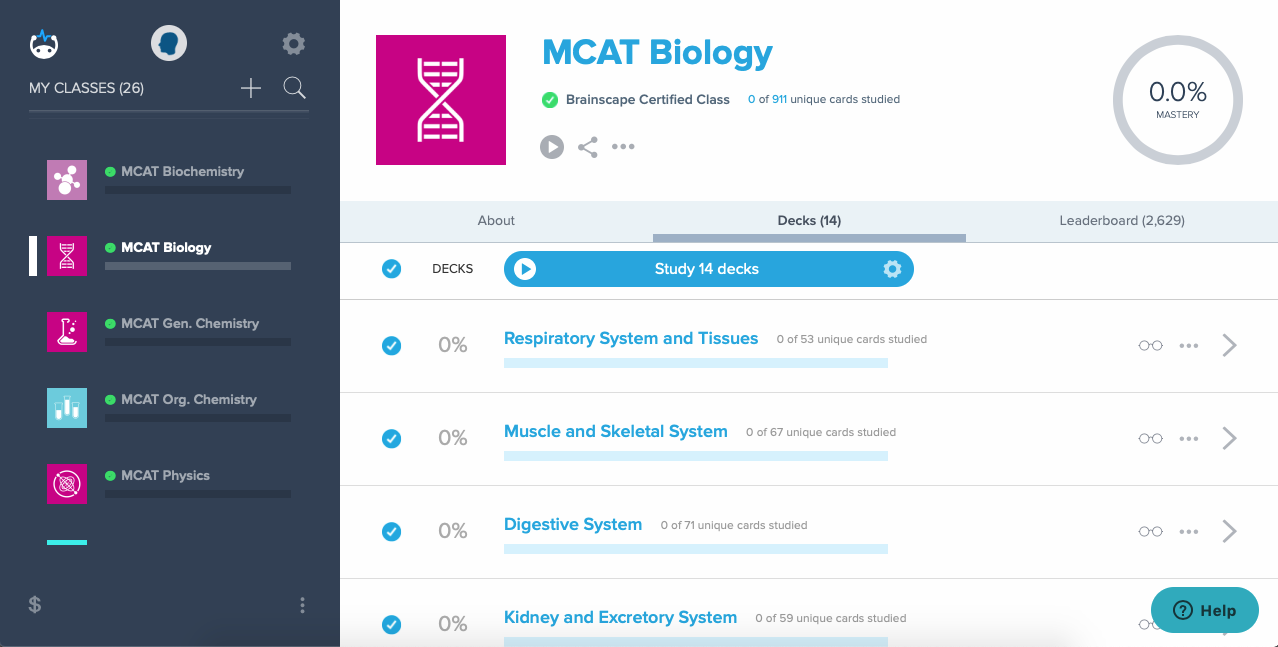Penicillin, the microwave, Teflon, and even Coca-Cola all have one thing in common: they were discovered quite by accident! But accidental successes are the exception, NOT the rule. You see, the vast majority of human triumphs are the consequence of meticulous planning. And the arenas in which this immutable law is particularly pervasive are science and medicine.
Therefore, as someone pursuing a career in medicine, it’s essential that you become comfortable with constructing robust blueprints for success. And this starts today with a study plan to ace your Medical College Admissions Test!
To help you, Brainscape has put our heads together with a panel of experts—led by Clara Gillan, an experienced MCAT tutor and 100th percentile test-taker with a score of 526—to curate the ultimate 3 month MCAT study plan. The team here at Brainscape has also developed these customizable (and free) MCAT study schedules and MCAT countdown planners you can make copies of and fill out, thereby laying out the micro-steps towards your ultimate goal of crushing the exam!
(*Insert thunderous applause*)
From three months out to the day right before the MCAT, we’ll guide you on how you should spend your time and what tasks you should give priority to as your test date draws nearer. If you follow this advice, you’ll be ready, without any aspect of the necessary MCAT preparation slipping between the cracks (because that can and does happen).
Before we dive in, however, allow us to introduce ourselves and why you can trust Brainscape to guide you on your MCAT study plan ...
Hi, we’re Brainscape!

And we’re a super valuable resource for MCAT studying.
We’ve dedicated much of our careers to understanding cognitive science literature in order to develop a study algorithm that leverages the brain’s hard-wiring for learning and retaining information. We did this because we found traditional study methods to be linear, passive, and really inefficient.
The fruit of our labors (and love) is Brainscape, an adaptive flashcard study platform that works with your brain to help you master your subject TWICE as efficiently as traditional study methods.
We’ve also worked with MCAT expert, Clara Gillan, Director of Product at MedSchoolCoach, to develop these 4,200+ smart, digital flashcards, which cover the highest-yield concepts in the AAMC test outline, as well as Blueprint, Khan Academy, Gold Standard, Princeton Review, Exam Krackers, and other MCAT prep providers. (We’ll be telling you more about our flashcards throughout this guide.)
An indelible part of how students can prepare efficiently and properly for the MCAT is designing (and sticking to!) a robust study plan; one that focuses on:
- Building and solidifying science knowledge,
- Honing critical analysis and reasoning skills,
- Optimizing mental attitude, and even
- Maintaining health and wellness.
With that said, let’s go … here’s the ultimate 3 month MCAT study plan!
If you’re all about learning more in less total time, you should definitely check out our guide: How to study for the MCAT more effectively!
Your MCAT study plan with three months to go
The day has arrived! You’re at the starting point of your MCAT preparation with three months to go until the exam. (And if you need help choosing an MCAT test date, read the linked article.) Where do you start and what should get priority attention during your first month? Here’s an overview:
- Have a study plan and stick to it (use our MCAT study planner templates to build that plan)
- Focus mostly on learning science content
- Keep up a good pace with your MCAT preparation
- Factor in plenty of time for review
- Take your first full-length MCAT practice test
- And keep up a good cadence of daily practice
- Audit your lifestyle
Now, let’s take a look ...
1. Have a study plan and stick to it

The very first task is to gather your resources, study materials, flashcards, practice tests, and question banks—in other words: everything you intend to use in your MCAT preparation—and draw up your own 3 month MCAT study plan. (Yes, we encourage you to add this guide to those resources! And YES this means you need to plan time to make your plan!)
For an excellent template to achieve this, go ahead and get yourself a copy of Brainscape's free, customizable three-month MCAT countdown planner, which allows you to portion your studies out into the days, weeks, and months you have leading up to the big day!
Keep these in mind:
- Set conservative goals that you can easily meet or exceed. If you do more, great!
- Balance your time between content studying and strategy/reasoning practice (including timed practice).
- Use multiple modalities for the spaced repetition of content review, such as study notes, flashcards*, and group study so that you don’t get bored.
- Spend time daily practicing MCAT passages, including timed practice.
- Do regular online full-length MCAT practice exams, with an entire day to review them.
- Build in LOTS of time to review your work!
*It’s scientifically proven that repeated exposure to the same information (spaced repetition) is the most efficient way to learn. This is particularly true for content-heavy subjects, just like ones you will have to master in order to pass the MCAT. Brainscape’s premade, certified MCAT flashcards are an excellent tool for this because they automate the spaced repetition of science content for you, using your confidence in every concept to determine how often to repeat it to you. More on this in a bit!
Once you have drawn up your MCAT study plan, stick it up on your wall so you’re constantly reminded of what you need to do.
And, finally, the most important part of this first step on your 3 month MCAT study plan: STICK TO IT!
If you say you’ll do it and if you write down a goal or commitment, do the damn thing! Three months can easily turn into two and a half (and then two, and so on) if you keep overhauling your study plan based on nervousness, indecision, or Lawd forbid, laziness.
But …
Having said the above, it’s okay (and good!) to make small tweaks to your MCAT study schedule over time. For example, if you gradually start to notice that physics is a weakness of yours, you absolutely should incorporate more physics review and practice. Just avoid changing your study plan drastically without good reason.
Want even more advice? Check out: How to set your MCAT study schedule
2. Focus mostly on learning science content
The first month of MCAT preparation should really focus on learning and reviewing the science content you’re required to know for the exam. So, at this stage, start working through your MCAT-specific book sets and free videos, which are available from multiple sources if you’re more of a visual/video-based learner.
Pro Tip: as you work through each content section, use Brainscape’s MCAT flashcards to really drill every concept into your brain.

Brainscape has distilled the MCAT curriculum, as specified by the AAMC official outline, down into a collection of 4,200+ smart flashcards. They also cover the most important concepts in Blueprint, Khan Academy, Gold Standard, The Princeton Review, Exam Krackers, and the other MCAT prep courses. So, no matter which provider you're using, we've got you covered!
These flashcards have then been neatly organized into seven classes of multiple decks each, which correspond to the key subjects you’ll be learning. So, for example, as you review organic chemistry in your notes, textbook, and study group, use Brainscape’s MCAT flashcards for organic chemistry. This particular class has 10 decks and a total of almost 500 flashcards, which you can use to review fundamental organic chemistry concepts, from bonding, analysis, and spectra to biological molecules and functional groups.
And, of course, being an app on your phone, you can study anytime, anywhere in whatever snatches of free time you have!
3. Keep up a good pace with your MCAT preparation
When studying science content, read actively and move through the material relatively briskly. Getting stuck on a chapter for two days because you NEED to understand every word is counterproductive. The MCAT tests an enormous body of knowledge so overly focusing on the minor details is, all too often, a waste of time.
We’ve met far too many students who spend days memorizing every term in the chapter on parts of the eye and ear, only to later realize that many exam administrations don’t have even one question about these topics. In MCAT prep, prioritization is better than perfection!
4. Factor in plenty of time for review
Content review isn’t a “one and done” endeavor: frequent review is essential, particularly in the areas you tend to struggle with. Without it, come exam time, you’ll probably forget most of what you learned early on in your MCAT study schedule. And the last thing you want on exam day is to have an epic brain fart.
So, factor in plenty of review time when designing your schedule. And, remember Brainscape’s MCAT flashcards are a great ally in this. Not only do they automate the review process for you—making it easy, convenient, and seamless—but they also help you learn far more efficiently (and remember for longer)!
5. Take your first full-length MCAT practice test

Many students wait until they feel confident in their science knowledge before they take their first full-length MCAT practice test. But leaving this essential practice for the end of your MCAT preparation is one of the worst mistakes you can make!
Taking a practice exam EARLY ON:
- Emphasizes the importance of honing both your content knowledge AND your critical thinking and reasoning skills;
- Allows you to tailor your MCAT study schedule for efficient, effective prep;
- Alerts you to what your struggles might be when you take on the real MCAT and, therefore, which of your skills or content areas you shouldn’t overlook; and
- Gives you the time to prepare yourself mentally and physically to take on 7.5 hours’ worth of exam.
It doesn’t matter that you don’t know everything yet. What matters is that you experience an MCAT exam in all its micro and macroscopic glory so that you know exactly what you’re preparing for. There is a ton of learning you need to do as an MCAT candidate, and the earlier you start, the better!
Read the full guide: How to get the most out of an MCAT practice exam
6. Keep up a good cadence of daily practice
Even as you spend most of your time reviewing science content, build both timed and untimed passage practice into your MCAT study schedule. This practice should cover both critical analysis and reasoning skills (CARS) and the sciences. A good resource for passage practice early on is the AAMC’s set of Question Packs.
These resources contain passages that are (on average) simpler and more content-focused than the AAMC’s other practice resources. This means that they aren’t all that similar to the “real MCAT”, which contains many dense and experiment-focused passages. But, the silver lining is that you can use them early in your schedule without worrying that you’re “using up” more representative practice.
And of course, all AAMC resources help you learn how the test-makers want you to think, which is incredibly valuable to understand as early on as possible!
7. Audit your lifestyle

Getting a good night’s sleep, exercising, drinking plenty of water, and healthy eating are ESSENTIAL for good brain health. And if you’re smart, which you obviously are, you’ll tweak your lifestyle so that you can give your brain what it needs. A healthy brain is sharp, focussed, and energized and this will make it an ally in your studies, rather than an obstacle.
To this point, many students complain that they don’t have time to plan healthy meals or take time out from their busy MCAT study schedules for exercise. Yes, you have a lot on your plate and you’re only now getting into the groove of your MCAT preparation; however, we wanted to mention a healthy lifestyle here because it is SO crucial for performing well, not only on exam day but in the weeks and months of hard study ahead of you.
So, if you’re struggling against fatigue, forgetfulness, and a lack of motivation, do a lifestyle audit and see where it is you could be short-changing your brain on what it needs to function optimally.
- Living on ramen noodles and take-out? Get onto a healthy, balanced diet!
- Relying on coffee and Red Bull to quench your thirst? Cut down on the caffeine and sugar, and hydrate on H20!
- Sacrificing precious sleep time for Netflix catch-ups? Time to get focused and prioritize sleep, my friend!
For the full guide on how to hack your brain health so that you ace your studies, check out our guide.
Your MCAT study plan with two months to go
You’ve officially passed the one-month mark of your MCAT study plan: two more months to go! So far, you should have taken your first full-length practice exam and gotten a taste of the challenge for which you are preparing. You should also have learned and reviewed most of the science content you’re required to know.
Now, your attention will be shifting to the following priority tasks:
- Register for the exam
- Transition to a practice-heavy MCAT study plan
- Take another two full-length MCAT practice tests
- Include full days for review
- Prepare yourself physically and mentally
- Use Brainscape to keep your content knowledge fresh
1. Register for the exam
If you haven’t registered for the exam yet, try to do that now. If no seats are available on your desired test date and in your desired location, check back every day to see if a spot opens up. Don’t freak out, though: seats DO open up, as other students reschedule their exams. As long as you check diligently, it’s overwhelmingly likely that you’ll get a spot when and where you want!
2. Transition to a practice-heavy MCAT study plan

In month two of your 3 month MCAT study plan, you should start to transition from a content-heavy study approach to a more practice-heavy one. It’s totally fine if you haven’t finished covering all of the science material yet (many students don’t finish until they have around six weeks left, or even less). But passage practice, including timed practice, should make up a substantial chunk of your MCAT study schedule from the two-month to the one-month mark.
Pro Tip: If you have access to both AAMC (the official MCAT makers) and non-AAMC practice, the non-AAMC practice can predominate at this point, but make sure to include at least some AAMC passages, too. If you’ve been using the AAMC Question Packs, keep doing so. The AAMC’s Official Guide Questions can also be good to incorporate around the eight to six-week mark.
3. Take another TWO full-length MCAT practice tests
As you head into the second month of your MCAT study plan, you should already have taken a full-length practice test—preferably an official AAMC one—so that you have a good idea of what the MCAT looks and feels like… all 7+ hours of it! Now it’s time to take your second and third practice test but space them apart by two weeks so that you really absorb maximum benefit from each.
Also, the AAMC only has five full-length exams and since they’re the best possible practice resource, you don’t want to blow through them all at once. What you can do, if you have other non-AAMC full-length tests, is squeeze those in every other week so that, together with the AAMC ones, you’re taking a practice exam every week.
When you do sit for a full-length practice test, as far as possible, try to recreate actual testing conditions. This means:
- Establishing a quiet and distraction-free space,
- Completing each section within the established time limits,
- Completing the entire exam within 7.5 hours, as will be the case with the real MCAT,
- Not referring to any notes or textbooks for assistance,
- Keeping things like water, food, and even chapstick at bay until you’ve completed a section because you won’t be allowed to take any of these into the exam room with you.
If you start feeling fatigued or restless, don’t quit, thinking you can just resume the practice test tomorrow! Rather, confront the way you feel and counteract any restlessness with some mental exercises to help you stay focused. This is important because you’re training your body and mind to take on a 7+ hour exam. If you feel this way now, you’ll probably feel this way when you sit for the real MCAT.
So, it’s better to work on your study focus now when your score isn’t quite as important!
4. Include full days for review

As always, include a full day in your MCAT study schedule to thoroughly review each practice test, paying as much attention to what you got wrong as to what you got right.
Yes, you heard that right: review your correct answers too! This will help to reinforce the knowledge and/or skills you deployed to answer that question correctly, while also weeding out those questions you got right by accident or mistaken logic, which happens a lot!
(Also, it feels kinda nice to appreciate how smart you are!)
Pro Tip: Use Brainscape to create flashcards for the concepts you struggled with or got wrong in your practice exams. Alternatively, locate them in Brainscape’s pre-made MCAT flashcard collection and bookmark them so that you can review the content again and again until it is drilled into your memory, preventing you from ever getting it wrong again!
5. Prepare yourself physically and mentally
At this point, you should have a bit of full-length MCAT practice under your belt so take a moment to self-assess. What did you feel after your practice exam? What was the hardest part of the challenge, both physically and mentally? Did you get cold, were your shoes killing you, did your anxiety trip up your concentration, did you find yourself running out of steam by the fifth hour, or was last night’s extra-spicy burrito burning a hole in your gut?
These aren’t details students often think of and yet, you’re going to need your brain and body operating at full capacity if you really want to score well. So, take note of your mental and physical difficulties or limitations, and either prepare for them or start working on them. If you tend to get cold, bring something warm to wear; if you’re prone to snack attacks, come prepared; and if you struggle to concentrate for long periods of time, you’d better start working on your focusing skills!
(Pssst: here are some cool focus exercises to build your attention span like a muscle!)
6. Use Brainscape to keep your content knowledge fresh
As we’ve mentioned, the second month of your MCAT study plan should definitely carry a bias towards the practical application of knowledge and the honing of your critical thinking and reasoning skills through exam, question, and passage practice.
But while this practice may revise certain aspects of your science knowledge, other aspects may become a little rusty from disuse. This is why it’s imperative that you factor in a little time every day to review the content you learned and memorized in month # 1. And the perfect tool for the job is Brainscape, naturally!

Curated by MCAT expert Clara Gillan, Brainscape’s flashcards cover every MCAT science subject, with a special focus on high-yield topics. But the real “secret sauce” to the efficacy of our study tool is that our flashcards are delivered by a spaced repetition algorithm that repeats, according to your unique needs, the concepts you struggle with more often, and those you find easy, less often.
This allows you to focus on your weaknesses without wasting time on the content you already know, and yet review all the content enough so that it doesn’t fade from memory. Also, because Brainscape is a mobile app or accessible via the web, you can fit in review sessions literally anywhere you go—on the bus, subway, train, or between classes, before bed at night, or in the bath.
All of these short 5, 10, 15-minute study sessions add up to a total net time that is as much as HALF of what you’d ordinarily spend on MCAT study! Think about it: if you’re diligent about using your free time throughout the day to review your science content in Brainscape, you can dedicate your sit-down study time to the all-important practice we’ve been talking about!

Brainscape’s MCAT flashcards are a powerful review tool to help you master and remember the facts you need to ace the exam, so we really recommend you use them to maintain a healthy cadence of daily review throughout your MCAT study plan!
Your MCAT study plan with one month to go
Right about now, sh*t’s gettin’ real. You’ve got one month—four weeks—before the MCAT and hopefully, by now, you’ve got an iron grip on the science content and burgeoning analytical and critical thinking skills. What should you be giving priority to in your final month? Here’s an overview:
- Assess whether you need to reschedule your MCAT test date
- Take a practice exam every week
- Do regular AAMC practice
- Start acclimatizing to possible MCAT environments
- Really focus on mental and physical health
1. Assess whether you need to reschedule your MCAT test date
At the one-month mark, it’s time to either commit to taking the MCAT on your scheduled date or to reschedule it. Honestly assess your progress and where you’re at, both regarding practice exam scores and the amount of science content you still have left to learn.
If you aren’t where you’d like to be, there’s nothing wrong with rescheduling. The key is to be honest with yourself. If you’re still 15 points away from your goal score, or if you have a lot of content left uncovered, it’s far better to reschedule now than to be left scrambling in two weeks (or to take the test and have to retake).
Just keep in mind that the AAMC has deadlines for rescheduling. Each deadline (organized as Gold, Silver, and Bronze zones) has different rescheduling fees. And past the bronze deadline, it’s too late to reschedule, barring extenuating circumstances and the AAMC’s mercy. So do not leave your rescheduling for the last minute if, at this point, you just don’t think you are where you need to be.
2. Take a practice exam every week
Make sure you’re taking practice exams every week now. And at least the last two to three exams you take should be scored AAMC practice tests (not practice exams from other companies).
Again: review your results carefully! Scrutinize your wrong answers to determine where your content knowledge and/or reasoning skills mislead you and scrutinize your right answers to make absolutely certain you know exactly why you got them right (as opposed to because of an educated or even lucky guess).
Better yet, also go back and review the practice tests you took right at the beginning of your 3 month MCAT study plan.
For example, if you took the AAMC Sample Test near the beginning of your MCAT preparation, go back and review each section. Ask yourself if you still understand why the right answer is right and the wrong answers are wrong. This review might surprise you! It often uncovers concepts that you used to know, but have since forgotten, as well as questions that you might not have reviewed optimally the first time around.
3. Do regular AAMC-specific practice
At this point, it’s super important to be doing regular, AAMC practice. The Section Bank is a great last-month resource—and don’t forget about the AAMC’s Official Guide questions, if you haven’t used those already, as well as any other passage-based resources you have remaining.
4. Get your day the right way around
As much as possible, fit your studying into the same time of day as when you’ll be taking the actual exam. So, if you’re used to waking up late and studying late into the night, set that alarm and force yourself to wake up earlier to get your work done before a reasonable hour.
It doesn’t matter how much you love studying at night—if you don’t learn to work, think, and perform productively during the day, how the heck can you expect to show up to the MCAT at 8 in the morning and do a good job?
5. Really focus on your mental and physical health

If you’re still subsisting on ramen noodles and caffeine and struggling to get decent sleep, it’s time to WAKE UP. We already covered this in the first month of this MCAT study plan but now we really want to ram the point home. Stop the excuses and get in control of your lifestyle so that you can benefit from a healthy, energized, and focused brain and body.
Here are some quick tips:
- Establish a healthy daily routine of waking up early and going to bed early. It doesn’t matter how well you concentrate at night: you’ll be taking the MCAT during the sweet light of day so you’d better acclimatize to day-time consciousness and productivity.
- Take an hour out of the day for some form of exercise, whether it’s a walk, run, gym session, yoga, or game of basketball.
- Set a daily water goal of (at least) half a gallon or two liters and try to cut down on the caffeinated and sugar-packed beverages.
- Eat three balanced meals per day with healthy grains, greens, fats, and proteins! Need a little help? Here are the best brain foods to eat before a test (+ sample grocery list!)
- If you’re feeling stressed out, tune into some mental exercises that can help you relax, like meditation or practicing gratitude. Also, check out Brainscape’s guide on how to manage MCAT stress.
Your MCAT study plan with two weeks to go
You know how a baby in the womb is essentially ready to be born after eight months but spends the final month putting on weight? This is somewhat like your MCAT preparation. You should essentially be ready at this point but now you’re taking time to fully flesh out your mastery of the necessary science content and critical thinking and analysis skills with relentless review and practice, practice, practice:
- Now’s your last chance to reschedule!
- Use up the last remaining AAMC materials
- Do any remaining non-AAMC practice exams
- Don’t forget about content review
- Make sure you’re on track
1. Now’s your last chance to reschedule!
If you’ve fallen behind in your MCAT preparation due to some extenuating circumstance, like you’ve been seriously ill or you’ve had a family tragedy, now is your absolute last chance to reschedule. The AAMC’s “Bronze Zone” deadline will likely fall in this interval, so keep that in mind. Do not reschedule just because you feel nervous because everyone does.
2. Use up the last remaining AAMC materials
Double-check that you’ve used all of the available online AAMC materials in your 3 month MCAT study plan or have a plan to use them within the next two weeks. Leaving AAMC resources unused is one of the most avoidable mistakes you can make!
3. Do any remaining non-AAMC practice exams
If you have extra non-AAMC practice exams leftover that you won’t have time to take, consider fitting in parts of them as individual sections. For example, if you bought four non-AAMC practice exams but still have two left, you may want to take just the psychology/sociology section of each to bring up any psych terms you may have missed. Or if chemistry/physics is your weakness, you can take just that section from each test for added timed practice.
4. Don’t forget about content review

Even in this last week, do not forget to review your science content! Here are two helpful exercises you can try:
Come up with a list of the top three science areas that you feel LEAST comfortable with (we like to think of them as “panic topics”: the topics that keep you awake at night, hoping you won’t see them on your exam). Then, go back and review them using Brainscape’s MCAT flashcards. This pays major dividends, not just in your own science mastery but also psychologically.
Then, with whatever time you have, review “low-yield” memorization-heavy concepts. These are topics that are within the MCAT scope, but that are tested rarely enough that they weren’t worth sinking a lot of time into earlier (especially given the likelihood that you’d just forget them anyway). A great example of this is the structures of the nitrogenous bases (adenine, cytosine, thymine, guanine, and uracil).
If you could use a little change of scenery, how about arranging a group study session in which you can run through these final areas?
5. Make sure you’re on track
You have two weeks left and the vast majority of your work behind you. But just to make 100% certain you haven’t allowed anything to accidentally slip through the cracks, go through the AAMC’s official outline with a fine-tooth comb. Make sure you’re familiar with every bullet point and if not, go back and review it!
Your MCAT study plan with a few days to go

You’re so close to the finish line, you can smell the celebratory champagne on the other side! With only days to go before the MCAT, how should you be spending your time? Here’s what we recommend:
- Know where you have to be on test day
- Be strict (and conservative) with lifestyle choices
- Consider giving yourself a day off
- Plan your celebrations!
What you’ll notice is that there isn’t much studying or practicing mentioned here. That’s because, if you have followed our MCAT study schedule to this point, you should be ready! All that’s left is some of the more administrative tasks ...
1. Know where you have to be on test day
Make sure you know where the testing center is located, how to get there, and where you can park (And, yes, we recommend actually driving there as a “practice run” in the days before your test). Nothing could be worse than getting lost, struggling to find parking, and then losing out on the exam because of it.
2. Be strict (and conservative) with lifestyle choices
Now more than ever, it’s essential that you get proper rest, hydrate, and eat well. And if you struggled to get that right up until this point, now’s the time. At the very least, you want to feel good, focused, and energized on exam day and you won’t do that if you only make changes the day before.
Pro Tip: Don’t get experimental with your food choices in the days before the exam. Stay healthy but stay conservative. You don’t want to discover you’re allergic to mushrooms the day before the MCAT … or give yourself “Delhi Belly” by trying the new Indian restaurant down the road. If you’re not used to certain foods or cuisines, rather save them for after the exam.
3. Consider giving yourself a day off
This might sound crazy but, honestly, if you aren’t prepared at this point, very little you do will make a significant difference to your MCAT scores. Actually, a day off to sleep, go for a long walk, and practice some mental exercises to get focused and relieve stress may do a lot more good than cramming.
If, however, your anxiety refuses to allow this, at least avoid dense or mentally difficult practice on this day. Focus instead on reviewing concepts you’ve memorized and, as always, Brainscape’s MCAT flashcards are a great tool for the job.
4. Plan your celebrations!

With just a few days left in the MCAT-shaped prison in which you’ve been living for the past three months, allow yourself to indulge in the excitement of picturing your freedom! What are you going to do when you step foot outside the examination room? How are you going to celebrate? Having something to look forward to can be enormously valuable in this final stretch!
MCAT preparation on D-Day
Okay, the day’s arrived and your 3 month MCAT study plan is officially done with (hopefully) every item and task ticked off. And technically while our work here is done, we thought we’d leave you with a handful of helpful tips for exam day just to see you safely on your way to success. Here they are:
- Eat a decent, healthy breakfast with a good balance of protein, fruits, and complex carbohydrates to keep you fuller for longer. Not too big a breakfast, mind. You don’t want to feel all bloated and sleepy.
- Resist the urge to “cram” or frantically study in the morning before you leave for the testing center (or even in the car in the parking lot). You’ve done what you can. Now be confident in where you’re at!
- Know the rules on what you can and can’t bring into the testing room. Most items aren’t allowed, even things like water and chapstick. However, you can still keep these in your locker outside the room, so don’t neglect to bring anything you think you might need during breaks.
- If you don’t feel adequately prepared—whether you genuinely aren’t or are just anxious—there is absolutely no point in freaking out. You may not be as prepared as you’d like but, remember, the MCAT has a heavy focus on critical thinking and analysis skills. And the most useful tool you have to take on that challenge is a calm, focused brain.
And finally: during the test, try to tackle each section fresh, without letting your perceived performance on the previous section(s) bother you.
“I can’t even count how many students I’ve worked with who felt like the first section went terribly and panicked throughout the rest of the exam as a result,” explains Clara Gillan, Brainscape’s MCAT expert. “Then, when they got their scores back, guess what? Their first section was fine, but their later sections had been adversely affected!
“It’s really, really hard to accurately gauge how you did on a section (or the entire exam) after the fact; we tend to think we did horribly when we actually did fine. It’s okay to feel that way, as long as we don’t let it affect our actions!”
A final word on the ultimate 3 month MCAT study plan

We have covered an epic amount of ground in this 3 month MCAT study plan. And we hope we’ve given you as much guidance as you can possibly stand in order to construct a robust MCAT study schedule that equips you for great success. In conclusion, we want to leave you with a few key thoughts …
- Remember, there’s more to scoring well on the MCAT than absorbing a planet-sized amount of science content. You need to also focus on honing your critical analysis and reasoning skills through relentless practice on (preferably) AAMC questions, passages, and practice test resources.
- Set conservative goals that you can easily meet or exceed, and dedicate yourself to building daily study habits, with the help of Brainscape’s MCAT flashcards, which will make the mountain of content you need to learn so much more manageable.
- Dedicate as much time to reviewing your practice test results as you do to actually taking them because that’s where so much important learning takes place. You’ll be robbing yourself if you don’t explicitly understand what you got right, what you got wrong, and WHY.
- And finally—we can’t stress this enough—look after yourself. Studying for the MCAT is an enormously taxing mental, psychological, and physical undertaking. So be an ally to your body and your brain by maintaining a healthy lifestyle.
The only remaining thing for us to say is: all the best on your MCAT! We hope you use the tools we’ve given you here to rise to your challenge!
For more awesome MCAT advice, check out the following free study guides:
